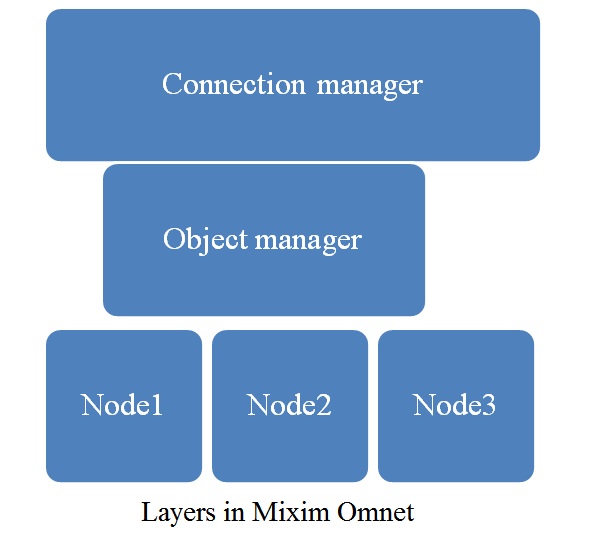Mixim Omnet
Mixim Omnet is mainly used in designing wireless sensor networks. Omnet++ provides network simulation, and in many cases, Omnet++ cannot support directly; in such cases, Mixim Omnet provides a framework which helps to simulate mobile and wireless networks. Researchers can now enhance their projects with AI-Powered VANET Simulation for more realistic vehicular network modeling.
What is Mixim ?
The name "Mixim" itself provides the information: it is a mixed simulator framework for wireless and mobile networks in Omnet++. Mixim Omnet gives detailed protocols and frameworks for many networks. These can be classified into the following groups, making it suitable for AI-Powered VANET Simulation projects.
1. Connectivity and mobility
2. Environment models
3. Reception and collision
4. Protocol library
5. Experiment support
Connectivity and mobility:
When a node in a network moves, it makes some changes in the network and has some influence over other nodes in the same network. The simulator has to provide the required graphical information about these changes, and Mixim Omnet supports this effectively. This is especially useful in AI-Powered VANET Simulation to track vehicle movements and dynamic interactions.
Environment models:
In a simulation network, the appropriate obstacles in the wireless network only have to be reflected. Mixim Omnet allows modeling of urban and highway environments, which is essential for accurate AI-Powered VANET Simulation.
Reception and collision:
In wireless networks, movements of nodes influence other nodes by sending and receiving messages or packets. These messages and packets are managed efficiently with Mixim Omnet, which ensures realistic traffic behavior for AI-Powered VANET Simulation.
Protocol Library:
These are the packages that contain ideas already implemented, allowing scholars to integrate advanced AI algorithms for AI-Powered VANET Simulation.
Experiment support:
These experiment supports help compare the results of new ideas with already developed ones. They also provide suitable templates for implementing original concepts in VANET projects.
How does Mixim Network work in Omnet++?

The following figure shows an example of a Mixim network. The object manager needs to control all the other nodes with the help of the connection manager. The connection manager controls other objects dynamically. The nodes can communicate with each other. Every object in the network is carried out in a limited area called the playground. The nodes may be mobile or immobile; if they are mobile, they move within the limited area. This feature is highly useful for AI-Powered VANET Simulation where mobility patterns are critical.
Mixim Omnet is powerful and provides a framework for simulating mobile and wireless networks. It helps researchers to compare their own ideas with already implemented ones. Our experts provide complete guidance for AI-Powered VANET Simulation projects using Mixim Omnet.
We provide full support for UG/PG scholars and Ph.D. scholars to simulate their wireless and mobile networks with the help of Mixim Omnet and advanced AI-Powered VANET Simulation techniques.
Article
The Best Choice
Services
Coding Implementation Services
OMNeT++ Coding Support
We offer a comprehensive OMNeT++ simulation tool that allows you to develop a wide range of OMNeT++ based networking Projects.
Read MoreNs3 Coding Support
Our team of experts develops custom NS-3 simulations and implements innovative protocols to address your unique networking challenges.cbg
Read MoreMATLAB Coding Support
Empower your research with our expert MATLAB coding assistance for research scholars
Read MorePython Coding Support
We provide comprehensive Python coding support for research scholars, from project conception to implementation and analysis
Read MoreCooja Contiki
We facilitate research progress by offering Cooja Contiki coding support for research scholars
Read MoreSumo Coding Support
We partner with research scholars by providing tailored Sumo coding support
Read MoreLatest Blog
Latest Articles From Our Blog Post

Latest Research and Thesis Topics in VANET
Vehicular Ad Hoc Networks (VANETs) represent a cutting-edge technology with the potential to revolutionize transportation systems.
Read More
PhD Guidance in Vehicular Ad Hoc Networks (VANET)
Vehicular Ad Hoc Networks (VANETs) are rapidly evolving, offering a transformative vision for the future of transportation.
Read MoreGet In Touch
Individuals investigating median pricing within their industry can greatly benefit from the expertise of leading researchers, particularly in areas such as research methodology, data coding, and academic writing.
No-35, South Usman Road,Chennai,India
phdacademy74@gmail.com
+91 8870457435
Popular Links
© PhD Academy. All Rights Reserved.